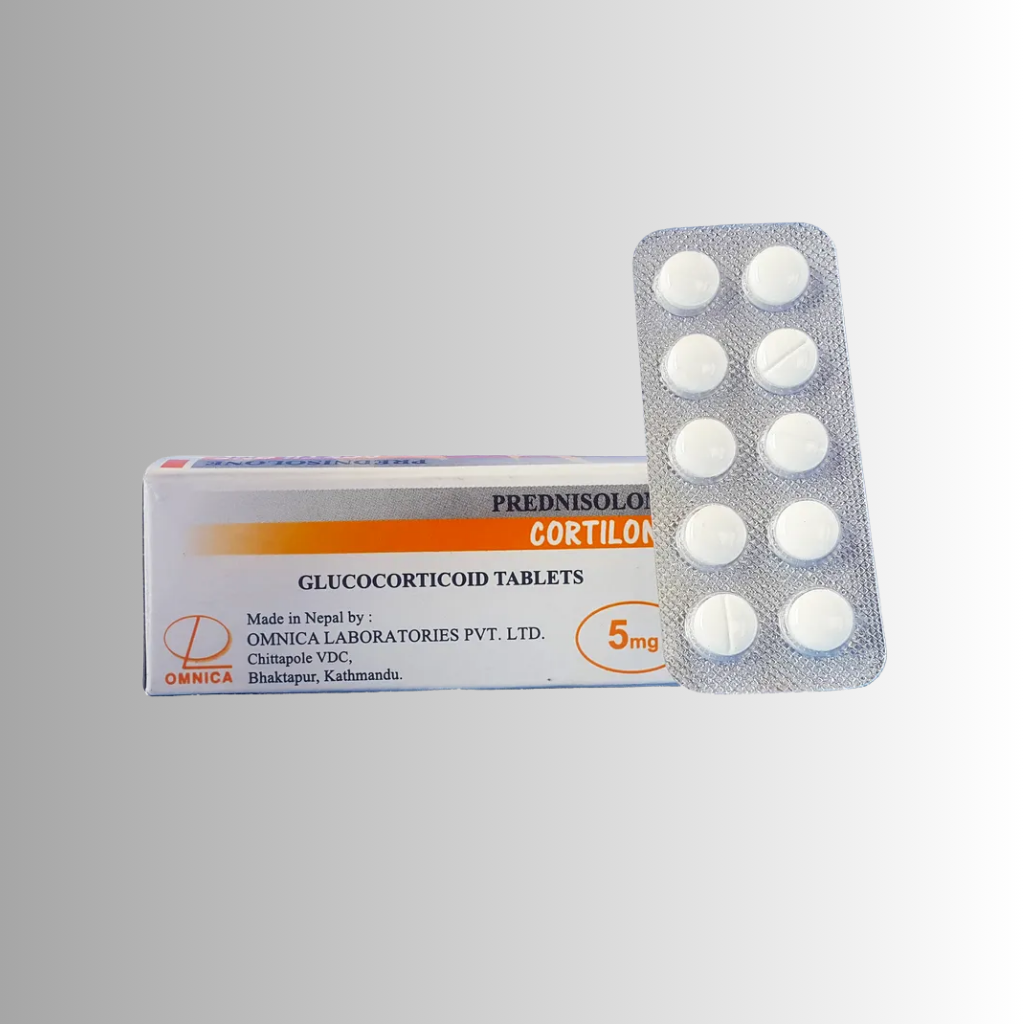Cortilone 5mg
“Cortilone 5mg” refers to a tablet containing 5mg of Prednisolone. Prednisolone is a powerful corticosteroid (steroid) medication used to treat a wide range of inflammatory, allergic, and autoimmune conditions. It works by suppressing the immune system and reducing inflammation.
₨20.00
Ask about productDescription
“Cortilone 5mg” refers to a tablet containing 5mg of Prednisolone. Prednisolone is a powerful corticosteroid (steroid) medication used to treat a wide range of inflammatory, allergic, and autoimmune conditions. It works by suppressing the immune system and reducing inflammation.
Active Ingredient:
- Prednisolone 5mg: A synthetic glucocorticoid, which is a type of corticosteroid.
Mechanism of Action: Prednisolone mimics the effects of cortisol, a hormone naturally produced by your adrenal glands. It primarily works by:
- Anti-inflammatory Action: It blocks the production of various chemical messengers (like prostaglandins and leukotrienes) in the body that cause inflammation (redness, swelling, pain).
- Immunosuppressive Action: It dampens the activity of the immune system. This is beneficial in autoimmune diseases where the immune system mistakenly attacks the body’s own tissues, or in allergic reactions where the immune response is overactive.
Key Uses: Cortilone 5mg (Prednisolone) is a versatile medication used to treat a vast array of conditions, including:
- Severe Allergic Reactions: Such as severe asthma attacks, severe skin reactions (e.g., severe eczema, hives), and allergic rhinitis.
- Inflammatory Conditions:
- Rheumatic Disorders: Rheumatoid arthritis, lupus (Systemic Lupus Erythematosus – SLE), polymyalgia rheumatica, giant cell arteritis.
- Skin Disorders: Severe eczema, psoriasis, dermatitis.
- Respiratory Disorders: Asthma (acute exacerbations and chronic management), Chronic Obstructive Pulmonary Disease (COPD) exacerbations.
- Gastrointestinal Disorders: Inflammatory Bowel Disease (IBD) like Crohn’s disease and ulcerative colitis.
- Eye Disorders: Inflammatory conditions of the eye like uveitis, optic neuritis.
- Kidney Disorders: Nephrotic syndrome.
- Blood Disorders: Idiopathic thrombocytopenic purpura (ITP), certain types of anemia.
- Autoimmune Diseases: Conditions where the immune system attacks the body’s own tissues (e.g., lupus, certain forms of vasculitis).
- Certain Cancers: As part of chemotherapy regimens (e.g., in lymphomas, leukemias) to reduce inflammation, control symptoms, or suppress immune reactions.
- Organ Transplant: To prevent rejection of transplanted organs.
Side Effects
Prednisolone can have a wide range of side effects, especially with higher doses or prolonged use. These side effects can be systemic (affecting the whole body).
Common Side Effects (often seen with short-term use):
- Increased appetite and weight gain: Due to fluid retention and changes in metabolism.
- Mood changes: Irritability, anxiety, insomnia, euphoria, depression.
- Upset stomach, indigestion, nausea
- Fluid retention (edema): Swelling in ankles or feet.
- Increased blood sugar levels: Can worsen existing diabetes or cause new onset diabetes.
- Headache
- Trouble sleeping (insomnia)
More Serious Side Effects (more common with long-term or high-dose use):
- Reduced Bone Density (Osteoporosis): Weakening of bones, leading to increased fracture risk.
- Increased Risk of Infections: By suppressing the immune system, it makes you more susceptible to bacterial, viral, and fungal infections. Existing infections can also worsen or reactivate (e.g., tuberculosis, herpes).
- Adrenal Suppression: The body’s own production of cortisol can decrease, especially after prolonged use. Abruptly stopping the medication can lead to withdrawal symptoms or adrenal crisis (severe fatigue, weakness, nausea, low blood pressure).
- High Blood Pressure (Hypertension)
- Cushingoid Appearance: Round face (“moon face”), fat buildup in the upper back (“buffalo hump”), thinning skin, easy bruising.
- Muscle Weakness and Wasting (Steroid Myopathy)
- Eye Problems: Glaucoma (increased eye pressure), cataracts (clouding of the eye lens).
- Stomach Ulcers/Bleeding: Especially when taken with NSAIDs (Non-Steroidal Anti-inflammatory Drugs).
- Growth Retardation in Children
- Skin problems: Thin, fragile skin, stretch marks, acne, impaired wound healing.
- Menstrual irregularities
Precautions
Prednisolone is a powerful medication and requires careful medical supervision.
- Do NOT Stop Abruptly: Never stop taking Cortilone 5mg suddenly, especially if you have been on it for more than a few days or at high doses. Abrupt discontinuation can lead to severe withdrawal symptoms or adrenal crisis. Your doctor will provide a tapering schedule to gradually reduce the dose.
- Infections:
- Inform your doctor if you have any current infections (bacterial, viral, fungal, parasitic) or a history of recurring infections (e.g., tuberculosis, herpes simplex, chickenpox, measles).
- Avoid contact with people who are ill or have infections (especially chickenpox or measles) if you haven’t had them or been vaccinated.
- Avoid “live” vaccines while on prednisolone, as they may not be effective or could cause the disease.
- Medical Conditions: Inform your doctor about your full medical history, especially if you have:
- Diabetes (monitor blood sugar closely)
- High blood pressure
- Heart failure or other heart problems
- Kidney or liver disease
- Osteoporosis or bone weakness
- Stomach ulcers or other gastrointestinal problems (e.g., diverticulitis, ulcerative colitis)
- Thyroid problems (hypothyroidism)
- Glaucoma or cataracts
- Mental health conditions (depression, psychosis)
- Myasthenia Gravis
- Convulsive disorders (epilepsy)
- Pregnancy and Breastfeeding: Use during pregnancy is generally not recommended unless the potential benefits outweigh the risks. Corticosteroids can pass into breast milk. Discuss thoroughly with your doctor.
- Drug Interactions: Inform your doctor about ALL medications (prescription, over-the-counter), herbal products, and supplements you are taking. Significant interactions include:
- NSAIDs (e.g., Aspirin, Ibuprofen, Diclofenac): Increased risk of stomach ulcers/bleeding.
- Diuretics (e.g., Furosemide): Can lead to potassium loss.
- Antidiabetic Medications: Prednisolone can increase blood sugar, requiring dose adjustments for diabetes medications.
- Blood Thinners (e.g., Warfarin): May alter the effect of blood thinners.
- Immunosuppressants: Can increase overall immunosuppression.
- Certain Antibiotics (e.g., Rifampicin, Erythromycin, Ketoconazole): Can affect prednisolone metabolism.
- Phenytoin, Phenobarbital, Carbamazepine: Can reduce prednisolone’s effectiveness.
- Alcohol: Avoid or limit alcohol consumption as it can increase the risk of stomach irritation/ulcers.
- Diet: Your doctor may recommend calcium and Vitamin D supplements to protect bone health, especially with long-term use. A low-sodium diet might also be advised if fluid retention is an issue.
- Driving/Operating Machinery: Cortilone can cause dizziness, blurred vision, or mood changes. Do not drive or operate machinery if you experience these side effects.
- Children and Elderly: These age groups may be more susceptible to side effects. Use with caution and specific dose adjustments.
- Medical Alert: Carry a medical alert card or wear a bracelet stating that you are taking a corticosteroid, especially if you are on long-term therapy, in case of emergency.
Prescription Information
- Availability: Cortilone 5mg is a prescription-only medication in Nepal and most other countries. It should only be used under the supervision of a qualified healthcare professional.
- Dosage: The dosage is highly individualized and depends on the condition being treated, its severity, and the patient’s response. It can range from 5mg daily to much higher doses, and often involves a tapering schedule.
- Example (illustrative, not prescriptive): For allergic/inflammatory conditions, initial doses might range from 5-60mg daily, often in divided doses or as a single morning dose. Maintenance doses can be 2.5-15mg daily.
- Administration: Take the tablet orally, usually with food or milk to minimize stomach upset. Swallow the tablet whole with a glass of water. It is often recommended to take the daily dose in the morning to align with the body’s natural cortisol rhythm and minimize sleep disturbances.
- Consistency: Take the medication exactly as prescribed by your doctor.
- Missed Dose: If you miss a dose, take it as soon as you remember unless it’s almost time for your next dose. In that case, skip the missed dose and continue with your regular schedule. Do not take a double dose.
- Storage: Store at room temperature (typically below 30°C), away from moisture, heat, and direct light. Keep out of reach of children. Do not use after the expiry date
Additional information
| form | Oral Tablets |
|---|







Reviews
There are no reviews yet.